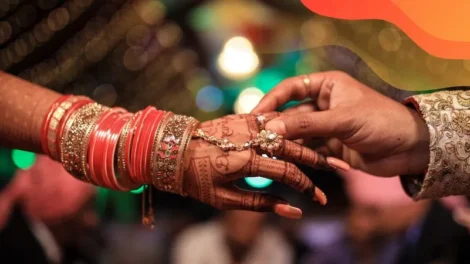Marriage represents love, commitment, and lifelong companionship. In today’s fast-changing world, marriage is changing. Our generation’s ideals and experiences are challenging traditional marriage.

Why marriage doesn’t work for our generation is a popular view. Changes in commitment, financial concerns, and a desire for personal fulfillment and individuality contribute to this sentiment. Thus, many are selecting different relationship patterns or delaying or forgoing marriage.
Marriage trends and statistics give fascinating insights into how our generation views this age-old institution. Marriage beliefs vary among millennials. Millennials’ commitment and marital expectations differ from previous generations.
These dynamics illuminate modern interactions. We can learn how cultural changes affect this basic human connection by investigating why some people don’t want a traditional marriage.
This section examines marriage’s shifting role in society. We’ll examine marital statistics and generational changes in marriage beliefs. We do so to better understand how our generation views and navigates modern relationships.
Table of Contents
The Importance of Individuality and Independence in Our Generation
Our generation values uniqueness and independence more. Relationships and personal decisions have changed. Traditional marital interest is one example of this trend.
Our generation is questioning marriage, a social norm and symbol of commitment. Personal progress and self-fulfillment are major causes of this.
Our age values autonomy and personal ambitions. Young individuals often put themselves first, even in marriage. They want the freedom to pursue their interests and jobs without a companion.
Our generation also prioritizes self-actualization. We think that pleasure comes from pursuing our dreams and achieving fulfillment inside ourselves, not from a romantic connection. This mindset urges us to prioritize self-growth and self-discovery over traditional roles or relationships that may not match our goals.
Embracing freedom and individuality does not imply ignoring meaningful relationships. Instead, it emphasizes honest interactions that foster personal growth and adventure.
Finally, our generation’s focus on self-fulfillment and personal progress threatens traditional marriage. This change indicates a desire to live truthfully and pursue our own happiness and fulfillment.
The pursuit of personal goals and ambitions
Our generation’s goals and desires have changed recently. Rather than marrying and settling down, many people today prioritize their own goals. Fear of losing independence and autonomy contributed to this move.
The fear of losing freedom and autonomy
For some, marriage means losing freedom. They worry that a lifetime partnership may limit their personal goals. This worry is natural in an independent, self-fulfilling society.
The rise of alternative lifestyle choices (cohabitation, open relationships)
Alternative lifestyles have also questioned traditional marriage. Open partnerships and cohabitation are replacing monogamous marriages. These alternatives allow people to stay independent while having meaningful relationships.
These changes do not mean marriage is bad or useless in today’s culture. They show our generation’s changing priorities. Many people prioritize personal aspirations over marriage expectations.
Each person’s marriage or lifestyle choice should reflect their values, desires, and circumstances. To develop successful partnerships that foster personal growth and goal attainment, individuals must openly discuss their expectations with possible partners.
Incompatibility and Lack of Compatibility Testing in Modern Relationships
Marriage and long-term partnerships are controversial in today’s fast-paced culture. Often we wonder why marriage doesn’t work for our generation. Modern relationships may lack compatibility testing.
When people have different personalities, values, and ambitions, they may not get along. These discrepancies can cause misunderstandings, fights, and breakups. Social standards and expectations forced many into marriage without considering these problems.
Recently, compatibility testing before long-term relationships has become more important. To determine compatibility, compatibility testing evaluates personality qualities, communication methods, financial views, and life goals.
Early compatibility tests can help couples identify future conflicts or mismatches. This proactive approach lets people discuss these issues and find common ground or make educated decisions about their future.
Compatibility testing improves self-awareness and partner preferences. It promotes self-reflection and uncovers hidden red flags or deal-breakers.
Compatibility testing can help build a strong foundation on shared values and understanding, but it cannot guarantee a perfect relationship or prevent all problems.
Finally, our generation’s lack of compatibility testing may explain why traditional marriage doesn’t always work. By adopting this practice and actively finding compatibility before committing to long-term partnerships, we can boost our chances of developing lasting, rewarding relationships.
Limited understanding of long-term compatibility factors during dating phase
Our generation seems to be ignoring long-term compatibility considerations while dating, which is causing marriage problems. Fearing marriage failure or sadness, many people avoid commitment.
Mismatched expectations regarding roles and responsibilities within marriage
Mismatched marriage role expectations are a major contributor to this issue. Couples often disagree about gender roles as they evolve. This can cause arguments and rifts.
Divergent financial goals and attitudes towards money management
Another factor is divergent financial goals and attitudes towards money management. Financial concerns generate marital strife. Conflict over spending, saving, and investing can strain a relationship.
Rising Divorce Rates as a Reflection of Changing Attitudes Towards Commitment and Lifelong Partnership
As commitment attitudes change, divorce rates rise. With more social acceptance of divorce and an emphasis on personal happiness, people may be more likely to divorce than work through problems or seek professional treatment.
Before marrying, couples should discuss expectations, values, and long-term aspirations. Premarital counseling or therapy can also help couples identify trouble areas and improve communication.
Ultimately, a successful marriage requires both parties to understand each other’s needs, compromise when required, and establish a strong bond based on trust, respect, and mutual support.
Growing acceptance of divorce as a viable option for unhappy marriages
Divorce is becoming more acceptable for unhappy marriages. Several things caused this mindset change.
Negative impact from witnessing high divorce rates among parents or relatives
Witnessing high divorce rates among parents or relatives might be detrimental. Witnessing these marriages’ challenges and tensions may make people more likely to divorce.
Lack of social stigma surrounding divorce
Also, divorce is no longer looked down on as much as it used to be. People who got divorced used to be looked down on or left out of society. Divorce has become less stigmatized as society becomes more open-minded.
Influence from media portrayal of failed marriages
Media portrayal also matters. Movies, TV, and other media depict failed marriages and divorces as realistic. Exposure to such storylines can change our view of marriage and make us question its efficacy in our own lives.
Ultimately, societal developments and interpersonal attitudes have made divorce a legitimate option for unhappy spouses. While not all marriages fail, this changing perspective reflects our generation’s drive for personal pleasure and fulfillment in partnerships.
Conclusion: Why Marriage Doesn’t Work For Our Generation
Why marriage doesn’t work for our generation? Marriage is being rethought due to shifting relationship types and societal expectations.
Our generation’s focus on personal growth and autonomy makes marriage unworkable. Traditional marriage can limit our independence and freedom.
Instead, we’re studying open communication, trust, and mutual respect paradigms in relationships. These models can adapt to different relationship needs.
Redefining partnerships entails challenging social norms. We must reject the illusion that a happy partnership requires a legal document or gender roles.
Communication and compromise are key to modern relationships. Healthy and fulfilling partnerships need to prioritize understanding each other’s needs, desires, and boundaries.
We must stay flexible as we negotiate modern relationships. We can reimagine marriage and relationships for our generation to bring happiness, fulfillment, and personal progress.



[…] can boost your attitude, reduce burnout, and revitalize you. Imbalance in family relations can be a reason to fail in marriage. Hence, always put family on the priority […]